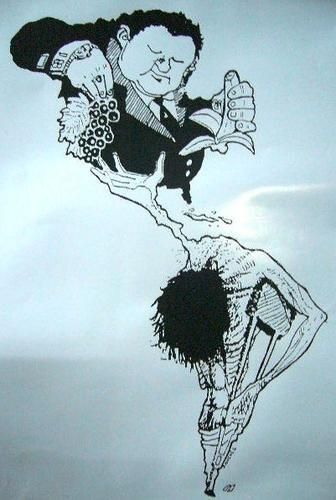
"Confronting development" -not routinely accepting it as the panacea of point IV proposed by President Harry Truman in 1949- is a vital necessity for us of the dependent world. Vital, because at stake are the autonomy, the personality and culture, the productive bases and the vision of the world that have given us the breath of life as human beings and peoples worthy of respect and a better future. Therefore, because Arturo Escobar's new book advances on such a strategic socio-political front, it should become a must-read for those who govern and those who are governed.
This is not just any author. Escobar is one of the first scholars in the world who, years ago, had the curiosity to wonder about the real meaning of the concept of "development". Together with Sachs and Illich, he took advantage of the philosophical frameworks of Foucault and Habermas to unravel the myth and reveal the prejudices that allowed the birth and rise of the developmentalist discourse in the United States and throughout Europe, which was then transmitted without further ado to the rest of the world by the United Nations during four "decades" of failures.
The reader of this book is impressed by the persistence of the discourse and ideology of developmentalism, even though the disastrous consequences of its application in the Third World are demonstrated on a daily basis. Perhaps its days are numbered. Because it is evident, for Tyrians and Trojans, that those who have really been developing, enriching themselves and accumulating power, have been those who in this unequal game had been positioned from before as the most privileged in the existing economic, social and political structure; neither the poor nor those dispossessed by the injustices of the capitalist system have developed in the same way or with the same intensity as had been postulated. And this is already very dangerous, even for the ruling classes. Because of the exorbitant capitalism that we imported when we "developed", today our countries are on the edge of the ecological desert and the explosive hell of the misery of the majorities. Moreover, the resulting mimetic servility threatens our historical and cultural roots.
Escobar's book, fortunately, does not stop at tearing away the veils of developmentalist ideology. It offers glimpses of alternative possibilities, for which the reader should be especially grateful. The invention of the Third World and the defense of cultural difference.Click to Tweet Too bad the author does not find adequate synonyms for the term, such as those interpretations of "development" that come from not too contaminated languages, like African Swahili or Guatemalan Mayan, which equate it with the interesting idea of "awakening with action." However, Escobar offers two new elements from which the alternatives that concern him could be derived.
They are the following:
- The collective action of social movements. Here is what could become the actor of a great awakening with popular struggle. For this we count in the Third World with the inexhaustible vein of diversity of cultures and peoples, even with the exuberant tropical biodiversity, which are key political, social and natural facts for our defense against the violent, creeping and greedy global capitalist exploitation.
Escobar and a good number of his colleagues had discovered this possibility when they decided to write in 1992 the collective The Making Social Movements in Latin America. Undoubtedly, a valid alternative to the usual development policies must come from that dynamic current that challenges the constituted powers.
- The invention of a language derived from hybrid cultures. The collective action of social movements must feed, according to Escobar, on the cultural and ethnic mix that has made our peoples a cauldron of change of infinite potential, and invent the language appropriate to this hybridism. He therefore transcends Vasconcelos and stops at García Canclini to reinterpret modernity in Latin America and the Third World, as a good step to abandon the mental schemes of colonial developmentalism.
Because this hybridism "determines the modern specificity of Latin America".
It is a matter, in effect, of recognizing the vigor of our own mestizo and cultured civilization which, without forgetting its roots, can assimilate progress because it suits it, as the indigenous people did when they adopted the iron, the hen or the sheep of the conquerors, and as the Kayapos of the Brazilian rainforest are doing today when they deploy their own video cameras. These groups and movements can manifest a proclivity for novelty in a critical, transgressive and sometimes humorous way.
As Escobar points out, the strategy of such groups is inspired by the defense of cultural difference, not as a static but as a transformative force, and by the valuation of economic needs and opportunities in terms that are not strictly those of profit and the market. How do these two strategic elements relate to the post-development to come? The author recommends transcending the differences with the First World through the possibility of defending our humanism within the postmodern horizon. This is a great ideal for a great task in which, it seems to me, we can expect even more engaging intellectual and practical contributions from postmodernists.

“Confrontar el desarrollo” –no aceptarlo de rutina como la panacea del punto IV propuesto por el presidente Harry Truman en 1949– es una necesidad vital para nosotros los del mundo dependiente. Vital, porque en ello se juegan la autonomía, la personalidad y la cultura, las bases productivas y la visión del mundo que nos han dado el hálito de vida como seres humanos y pueblos dignos de respeto y de un mejor futuro. Por ello, porque el nuevo libro de Arturo Escobar avanza sobre tan estratégico frente sociopolítico, este debe convertirse en lectura obligada de gobernantes y gobernados.
No se trata de cualquier autor. Escobar es uno de los primeros estudiosos del mundo que hace años tuvieron la curiosidad de preguntarse por el sentido real del concepto de “desarrollo”. Junto con Sachs e Illich aprovechó los marcos filosóficos de Foucault y Habermas para desmenuzar el mito y revelar los prejuicios que permitieron el nacimiento y auge del discurso desarrollista en Estados Unidos y en toda Europa, que luego fue transmitiendo sin más al resto del mundo por las Naciones Unidas durante cuatro “décadas” de fracasos.
Queda el lector de este libro impresionado por la persistencia del discurso e ideología del desarrollismo, así se demuestren a diario las nefastas consecuencias de su aplicación en el Tercer Mundo. Quizá tenga los días contados. Porque es evidente, para tirios y troyanos, que los que en verdad se han venido desarrollando, enriqueciendo y acumulando poder, han sido los que en este desigual juego se habían situado desde antes como los más privilegiados en la estructura económica, social y política existente; ni los pobres ni los desposeídos por las injusticias del sistema capitalista se han desarrollado de la misma manera o con igual intensidad como se había postulado. Y ello es ya muy peligroso, hasta para las clases dominantes. Porque de la mano del capitalismo desorbitado que importamos al “desarrollarnos”, hoy nuestros países se encuentran al borde del desierto ecológico y del infierno explosivo de la miseria de las mayorías. Además, el servilismo mimético resultante amenaza nuestras raíces históricas y culturales.
El libro de Escobar, por fortuna, no se detiene solo en rasgar los velos de la ideología desarrollista. Ofrece destellos de posibilidades alternativas, lo que el lector debe agradecer de manera especial. La invención del Tercer Mundo y la defensa de la diferencia cultural.Haz Clic para Twittear Lástima que el autor no le encuentre sinónimos adecuados al término, como aquellas interpretaciones de “desarrollo” que provienen de idiomas no muy contaminados, como el swahili africano o el maya guatemalteco, que lo equiparan a la interesante idea de “despertar con acción”. No obstante, Escobar ofrece dos elementos nuevos de los que podrían derivarse las alternativas que le preocupan.
Son los siguientes:
- La acción colectiva de los movimientos sociales. He aquí lo que pudiera convertirse en el actor de un gran despertar con lucha popular. Para ello contamos en el Tercer Mundo con la inagotable veta de la diversidad de culturas y pueblos, hasta con la exuberante biodiversidad tropical, que son hechos políticos, sociales y naturales clave para nuestra defensa ante la violenta, rasante y avara explotación capitalista global.
Escobar y un buen número de sus colegas habían descubierto esta posibilidad cuando decidieron escribir en 1992 el colectivo The Making Social Movements in Latin America. Indudablemente, una alternativa válida a las políticas usuales de desarrollo, debe provenir de aquella dinámica corriente que reta a los poderes constituidos.
- El invento de un lenguaje derivado de culturas híbridas. La acción colectiva de los movimientos sociales debe alimentarse, según Escobar, de la mezcla cultural y étnica que ha hecho de nuestros pueblos una caldera de cambios de infinito potencial, e inventar el lenguaje adecuado a este hibridismo. Trasciende por ello a Vasconcelos y se detiene en García Canclini para reinterpretar la modernidad en América Latina y en el Tercer Mundo, como un buen paso para abandonar los esquemas mentales del desarrollismo colonial.
Porque este hibridismo “determina la especificidad moderna de América Latina”.
Se trata, en efecto, de reconocer el vigor de nuestro propia civilización mestiza y culta que, sin olvidar sus raíces, puede asimilar el progreso porque así le conviene, como lo hicieron los indígenas al adoptar el hierro, la gallina o la oveja de los conquistadores, y como lo hacen hoy los kayapos de la selva húmeda brasileña al desplegar sus propias cámaras de video. Estos grupos y movimientos pueden manifestar proclividad hacia lo novedoso de manera crítica, transgresiva y a veces con humor.
Como lo señala Escobar, la estrategia de tales agrupaciones se inspira en la defensa de la diferencia cultural, no como una fuerza estática sino transformadora, y en la valoración de necesidades y oportunidades económicas en términos que no son estrictamente los de la ganancia y el mercado. De allí puede surgir un discurso alterno entendible en nuestros propios términos, que son los que deben contar en última instancia.¿Cómo se relacionan estos dos elementos estratégicos con el posdesarrollo que viene? El autor recomienda trascender las diferencias con el Primer Mundo a través de la posibilidad de defender nuestro humanismo dentro del horizonte posmoderno. Es grande ideal para una gran tarea en la que, según me parece, cabe esperar todavía más comprometedoras contribuciones intelectuales y prácticas de los posmodernistas.

Final image / Imagen final: Unsplash by Tony Lam Hoang.
Mis Blogs y Sitios Web / My Blogs & Websites:
- La Cucina di Susana.
- Cucinando con Susana
- El Mundo de los Postres
- Crónicas de Un Mundo en Conflicto.

Upvoted. Thank You for sending some of your rewards to @null. Get more BLURT:
@ mariuszkarowski/how-to-get-automatic-upvote-from-my-accounts@ blurtbooster/blurt-booster-introduction-rules-and-guidelines-1699999662965@ nalexadre/blurt-nexus-creating-an-affiliate-account-1700008765859@ kryptodenno - win BLURT POWER delegationNote: This bot will not vote on AI-generated content
Thank you for curating and voting for my content @ctime.